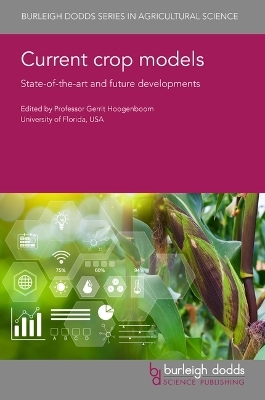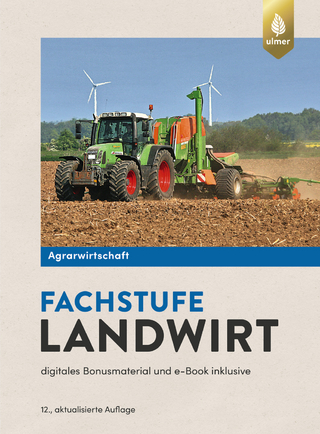
Current Crop Models
Burleigh Dodds Science Publishing Limited (Verlag)
978-1-80146-972-2 (ISBN)
- Noch nicht erschienen (ca. September 2025)
- Versandkostenfrei
- Auch auf Rechnung
- Artikel merken
Whilst crop models have made significant progress in recent years, different models still diverge and struggle to predict the complex effects of genetic, environmental and management (G x E x M) variables in optimising crop production in the face of climate change.
Current crop models: State-of-the-art and future developments provides a comprehensive overview of the major crop models and the ways they address these challenges. The book explores the development of major crop models such as DSSAT, how variables such as crop variety and genetic differences are being addressed, recent model improvements and future model enhancements, as well as examples of current applications to improve crop production.
The book builds on a successful earlier volume published by Burleigh Dodds Science: Advances in crop modelling for a more sustainable agriculture (2019).
Dr Gerrit Hoogenboom is Professor and Preeminent Scholar in the Department of Agricultural and Biological Engineering at the University of Florida, USA. With over 30 years’ experience and over 500 peer-reviewed publications, he is acknowledged as a global expert in crop modelling. He currently coordinates development of the Decision Support System for Agrotechnology Transfer (DSSAT), one of the leading crop modelling systems. Professor Hoogenboom also co-authored the chapter on DSSAT in Burleigh Dodds Science’s successful 2019 title: Advances in crop modelling for a sustainable agriculture (ed. Ken Boote). Professor Hoogenboom is the Editor-in-Chief of The Journal of Agricultural Science.
Part 1 North America
1.The DSSAT crop model ecosystem: Ken Boote, Univeristy of Florida, USA;
2.The USDA-SIM crop model: David Fleisher, USDA-ARS, USA;
3.The Cycles crop model: Armen Kemanian, Penn State University, USA;
4.The EPIC and APEX crop models: Jaehak Jeong, Texas A&M University, USA;
5.The SSM-Crop model: Tom Sinclair, North Carolina State University, USA;
6.The Ecosys crop model: Kaiyu Guan, University of Illinois, USA;
7.The SALUS crop model: Bruno Basso, Michigan State University, USA;
8.The DNDC crop model: Bill Salas, Regrow Ag, USA;
9.The ALMANAC crop model: Jim Kiniry, USDA-ARS, USA;
Part 2 Europe
10.The STICS crop model: Benjamin Dumont, University of Liege, Belgium;
11.The SiriusQuality crop model: Pierre Martre, INRAE, France;
12.The SARRA-H /SAMARA crop model: Myriam Adam, CIRAD, France;
13.The GECROS crop model: Xinyou Yin, Wageningen University, The Netherlands;
14.The WOFOST crop model: Allard de Wit, Wageningen University, The Netherlands;
15.The LINTUL crop model: Tom Schut, Wageningen University, The Netherlands;
16.The SWAP crop model: Iwan Supit, Wageningen University, The Netherlands;
17.The SIMPLACE crop and ecosystem management model: Frank Ewert, University of Bonn, Germany;
18.The MONICA and HERMES crop models: Claas Nendel, Leibniz Centre for Agricultural Landscape Research, Germany;
19.The AquaCrop model: Dirk Raes, Katholieke Universiteit Leuven, Belgium;
20.The Daisy crop model: Kiril Manevski, Aarhus University, Denmark;
Part 3 Asia and the Pacific
21.The InfoCrop model: Soora Naresh Kumar, Indian Agricultural Research Institute, India;
22.The CropGrow model: Yan Zhu, Nanjiang Agricultural University, China;
| Erscheint lt. Verlag | 30.9.2025 |
|---|---|
| Reihe/Serie | Burleigh Dodds Series in Agricultural Science |
| Co-Autor | Emeritus Professor Ken Boote, Dr David Fleisher, Professor Armen Kemanian, Dr Jaehak Jeong |
| Zusatzinfo | Color tables, photos and figures |
| Verlagsort | Cambridge |
| Sprache | englisch |
| Maße | 152 x 229 mm |
| Themenwelt | Weitere Fachgebiete ► Land- / Forstwirtschaft / Fischerei |
| ISBN-10 | 1-80146-972-5 / 1801469725 |
| ISBN-13 | 978-1-80146-972-2 / 9781801469722 |
| Zustand | Neuware |
| Informationen gemäß Produktsicherheitsverordnung (GPSR) | |
| Haben Sie eine Frage zum Produkt? |
aus dem Bereich


